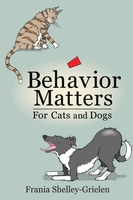- Regular walks with your puppy will help socialize her to the big outside world, offer her opportunities to explore it and sniff, aid in house training and teach her to walk on leash. Giving puppy enough time to smell cannot be emphasized enough, let her sniff and sniff and sniff, it's how she "sees" her new world. Avoid choke, prong or head halters which are painful, inhibit learning due to stress and can damage puppy's anatomy. Select Y shaped harnesses instead that attach in the front. Make sure your leash is 4-6 feet long, no extending leashes so puppy can learn to walk with you and no chain link which can be tough on human hands. Vary your walks to offer new environments.
- Your puppy is a baby and does not come to you housebroken. She is still growing and cannot fully control her bodily functions she needs frequent (hourly) walks to eliminate and to learn where you would like her to do her eliminating. We often ask so much more of this canine species than our human babies in this regard-who get to wear diapers for years and then still require extensive potty training! (More on housebreaking tips.)
- Your puppy can learn that biting is a game with her humans and with teething coming on (generally between 4-7 months), if not effectively addressed, this is a game that puppy, much to their confusion will not be allowed to still enjoy when older.
Frequent and regular puppy play groups will develop much needed puppy socialization skills and help to develop bite inhibition with conspecifics (other puppies). For her human interaction in this regard, redirecting your puppy with a one word redirection, offering a toy to bite or chase when she is about to bite or is biting will help if done consistently and repeatedly. (Continue Reading Below)

